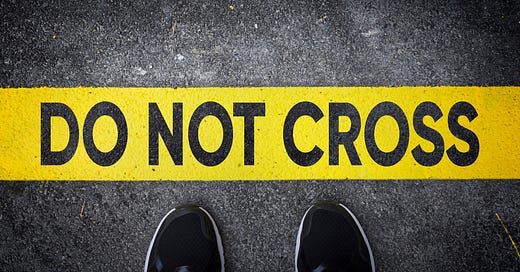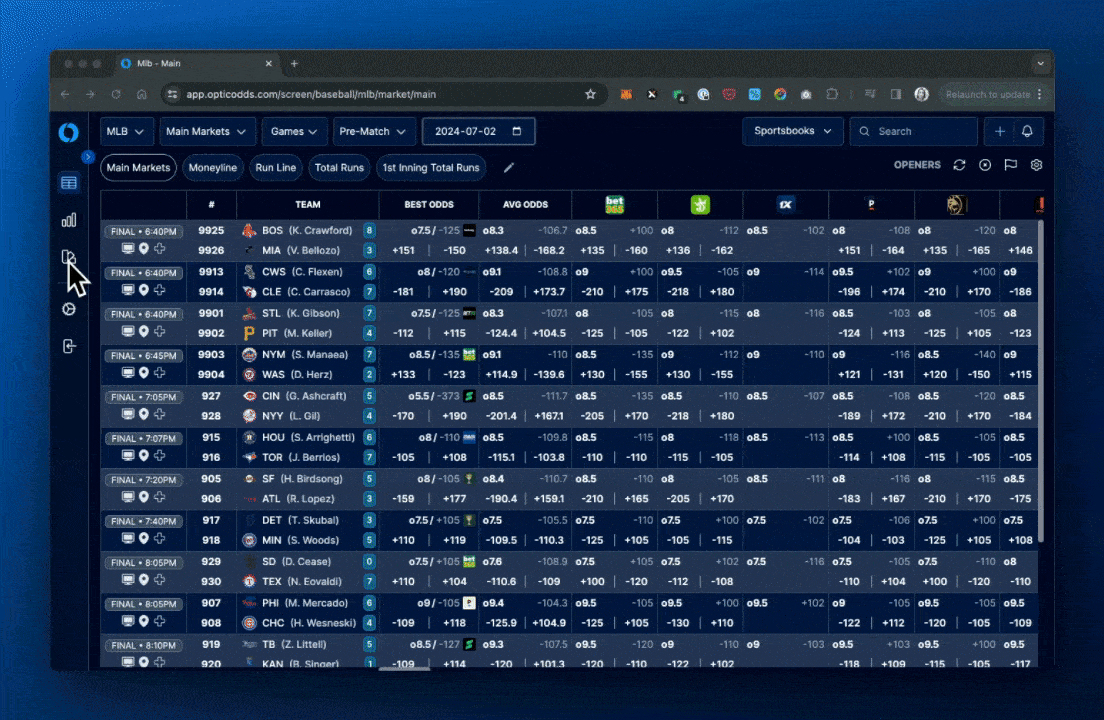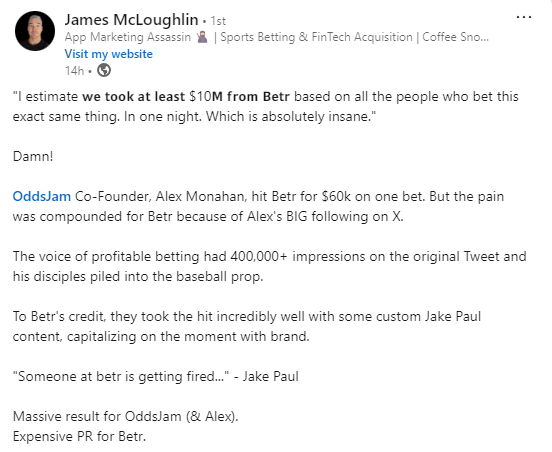Double Whammy
DraftKings receives a fine and a dressing down from New Jersey Division of Gaming Enforcement acting director Mary Jo Flaherty for several months of reporting errors.
The Bulletin Board
NEWS: The New Jersey Division of Gaming Enforcement issues a fine and a strongly-worded warning to DraftKings for reporting errors.
NEWS: Virginia lawmaker takes aim at DFS 2.0 but with a different approach.
QUICK HITTER: A new report out of North Carolina details political contributions from gambling firms.
NEWS: Operators and states have fine-tuned their mobile launch processes.
AROUND the WATERCOOLER: Betr gets bested.
STRAY THOUGHTS: Most discussions, at least those worth having, are complex.
SPONSOR’S MESSAGE - Sporttrade was borne out of the belief that the golden age of sports betting has yet to come. Combining proprietary technology, thoughtful design, and capital markets expertise, our platform endeavors to modernize sports betting for a more equitable, responsible, and accessible future.
Sporttrade’s newest feature, The Tape, prints all trades made on the app in real-time.
DraftKings Receives a Fine and Stern Warning from NJ DGE Director
First reported by the AP, DraftKings got dinged with a $100k fine from the New Jersey Division of Gaming Enforcement for reporting inaccurate parlay betting numbers over several months. According to DraftKings, the errors were the result of a coding error in a new database.
The fine may seem small in the grand scheme, but it is quite large for the DGE. And, as SportsHandle’s Chris Altruda reminded me, this is the second six-figure fine the DGE has given DraftKings, which received a $150,000 fine in March 2022 “for a series of out-of-state wagers in November 2020 placed by a customer in Florida through a proxy bettor.”
More troubling than the fine (if you’re DraftKings) was the dressing-down from acting NJ DGE Director Mary Jo Flaherty, who called the mistakes “unacceptable.”
“These types of gross errors and failures cannot be tolerated in the New Jersey gaming regulatory system,” Flaherty said.
Flaherty’s words are not hyperbolic. As the AP reported, “The errors resulted in regulators having to post corrected financial data for several months, something that had not happened in 13 years.”
Industry watcher Alfonso Straffon spotted the possible reporting errors way back in March:
For those keeping receipts, this one will definitely go in the shoe box.
Is Virginia on the Right Track When it Comes to DFS 2.0?
Virginia Del. Paul Krizek intends to introduce legislation in 2025 to clarify the currently muddy waters between sports betting and daily fantasy sports, which he told the Virginia Mercury was “a compliance nightmare.”
Krizek stopped well short of advocating for a ban on certain DFS products, which were increasingly popular earlier this year. Instead, he would like to see the products reined in, with more continuity across what is and isn’t permissible.
As Compliance+More reported on this topic earlier this week:
“He [Krizek] aims to bridge these gaps and create a level playing field for all involved, including:
Age requirements: sports betting is 21+ and DFS is 18+.
Problem gambling funding: 2.5% of sports betting revenue must be directed towards problem gambling treatment, but DFS operators do not have this requirement.
Licensing fees: sports-betting licenses cost $250k, with an annual renewal fee of $200k; DFS licenses cost $8,300 per year.
DraftKings lobbyist John Mohrmann also spoke with the Mercury, saying wagering options available through sports betting apps are also available on DFS apps (namely player props, not team or outcome bets), but under the current set of rules, two different agencies are enforcing two sets of rules.
As the Mercury reports:
“Sports betting is regulated by the Virginia Lottery, which requires betting platforms to pay a $250,000 fee when first applying for a permit and a $200,000 yearly renewal fee. Fantasy sports are overseen by the Virginia Department of Agriculture and Consumer Services (VDACS), which assesses an $8,300 fee for initial permits and yearly renewals.”
DFS companies are quick to note that their offerings are far more limited. As Underdog Fantasy (a newsletter sponsor) General Counsel Nicholas Green said last year, there are restrictions that fantasy sports operators must abide by that sportsbooks do not.
One idea Krizek floated to the Virginia Mercury was raising the age to play DFS to 21, which would align with the state’s legal sports betting age—the legal age to sign up for a DFS account is 18 in most locales.
Another point of conflict between the two industries mentioned in the column is problem gambling funding. Part of sports betting revenue is earmarked for it, while DFS revenue is not.
The approach being taken is interesting, as it signals a willingness to meet in the middle. Whether that actually happens is another story, but over the last year, the conversation has been far more adversarial, with the focus on prohibition, not amending regulations.
SPONSOR’S MESSAGE - Underdog: the most innovative company in sports gaming.
At Underdog we use our own tech stack to create the industry’s most popular games, designing products specifically for the American sports fan.
Join us as we build the future of sports gaming.
Visit: https://underdogfantasy.com/careers
Quick Hitter: Gambling Firms Donate to NC Political Campaigns
Gambling dollars are flowing into the coffers of North Carolina political campaigns.
In a report from the Carolina Public Press, “Gambling interests donated more than $3 million to top N.C. lawmakers and political committees over the past two years in an effort to legalize forms of gambling in the state.”
Notably, the practice is legal, but as Christopher Cooper, a professor of political science and public affairs at Western Carolina University, said, the public should understand where the money comes from. “These interests are going to continue to give money, so even if the legislation doesn’t make it in this session, it will be brought up again in the future,” Cooper said.
This is happening in almost every state (some states don’t allow direct donations from gambling companies), and again, it is entirely legal. But the report is a great look at how the sausage is made.
They Grow Up So Quick: Market Launches Increasingly Efficient
The difference between a new state launch in 2024 and 2018, let alone 2013, is remarkable. The total online casino revenue generated by New Jersey for the entirety of 2014 was $123 million. New Jersey’s online casino industry now easily eclipses that tally in a single month.
Sports betting markets now launch at near-maturity, as operators, the media, and regulators have learned with each subsequent launch:
Operators have experimented with bonus and promotional offers and have a better understanding of what appeals to bettors.
Affiliates and local media are better at relaying information to residents.
State regulators now allow operators to engage in a preregistration period.
Further, launches tend to occur around a tentpole event like March Madness, the start of the NFL season, or the Super Bowl.
How efficient have new state launches become? Per Eilers & Krejcik Gaming (a newsletter sponsor), 5% of North Carolina adults registered an online sports betting account within the first 45 days of launch.
The rapid maturity, coupled with FanDuel and DraftKings’ out-of-the-gate dominance, could change how other operators approach new markets. Do they put everything into an opening salvo, or do they sit back and bide their time, hoping to enter the market when the initial bonuses and promotions have died down? In my opinion, the appropriate course of action is very operator-dependent.
SPONSOR’S MESSAGE - Join hundreds of operators using OpticOdds for trading, risk management, and Same Game Parlay analysis.
Real-time data and trading tools for sports betting + fantasy operators. Built by those who have done it before.
Looking to join the fastest-growing data provider in the sports betting industry? Join the team now.
Around the Watercooler
Social media conversations, rumors, and gossip.
You may have seen Jake Paul ranting about a Betr customer taking advantage of a promo and handing the book a $60,000 loss.
The customer was Alex Monahan, the co-founder of OddsJam (OddsJam’s CEO Matt Restivo was a guest on Episode 11 of the podcast)
And if you’re wondering if Paul is really going to fire someone over the promotion, the answer might be yes, as it appears Monahan wasn’t the only winner:
Stray Thoughts
If you’ve got a simple answer to something, you probably haven’t given it much thought.









